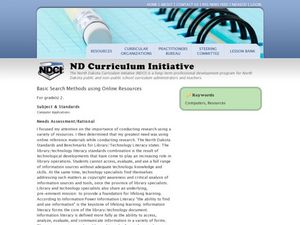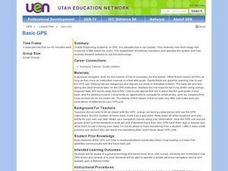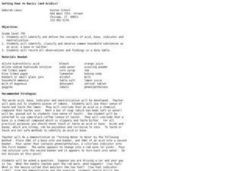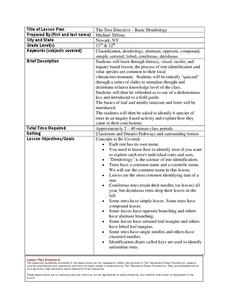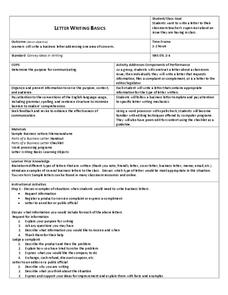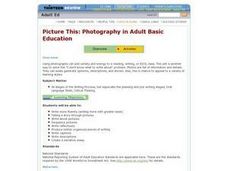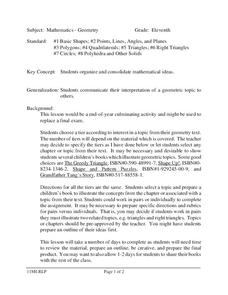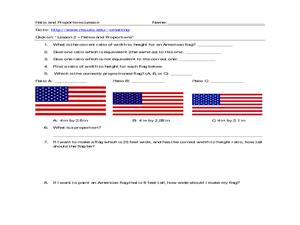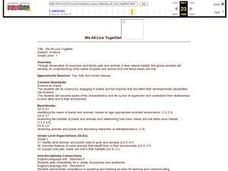Curated OER
Banking Basics Extension 3.3
In this checking account register in the financial life of a teenager worksheet, students read and solve word problems. Students solve 10 problems.
Curated OER
Basic Search Methods Using Online Resources
Second graders practice using technology to gather information. In this online research lesson, 2nd graders use technology to find information for a research project. Students write a research paper, and give a presentation to the class...
Curated OER
Basic GPS
Learners discuss benefits of global positioning systems (GPS) and practice using them on the school grounds. A personal navigator, such as, the Garmin eTrex is necessary for this instructional activity.
Curated OER
Basic Introduction to Foundation of Life: Genes, Genetics and Genetic Diseases
Students are introduced to genetics along with genetic diseases and heredity. In groups, they complete a Punnett Square to determine the dominant and recessive genes. After viewing diagrams, they identify the characteristics of DNA and...
Curated OER
Getting Down to Basics (and Acidics)
Seventh graders investigate acids and bases. In this acids and bases activity, 7th graders use household items such as coffee, lemons and soap to define acids and bases. They observe a demonstration to show how indicators determine if a...
Curated OER
The Tree Detective - Basic Dendrology
Students identify tree species by their leaf characteristics. In this dendrology lesson, students learn leaf vocabulary and collect leaves. They identify the leaves using the leaf characteristics and the vocabulary that they learned.
Curated OER
Letter Writing Basics
Students write a business letter with information regarding specific writing mechanics. In this writing lesson, students learn to write a business letter and they focus on one area of concern. Students follow a business letter template...
Curated OER
Picture This: Photography in Adult Basic Education
Students use photos to generate opinions and feelings for them to write about. They use the photos to find something they are interested in and help them write.
Curated OER
FRAMES OF REFERENCE: THE BASICS
High schoolers examine the concept of frames of reference in physics: that two frames of reference, each moving with respect to the other with a constant velocity v, observe the same accelerations and therefore Newton's laws are the same...
Curated OER
Human Body Basics
For this human body worksheet, students are given clues to find hidden words in boxes. Topics include the human body systems, the components of living things and the building blocks of life.
Curated OER
Basic Shapes
Students create books about shapes. In this shape lesson, students select a topic such as points, lines, angles, planes, polygons, quadrilaterals, triangles, circles, and polyhedra. In groups, they create an illustrated children's book...
Curated OER
The American Flag-Basic Ratios and Proportions
Students solve problems with ratios and proportions. In this algebra instructional activity,students apply the concept of ratios and proportions to the real world.
Curated OER
Cells: The Basic Units of Life
In this cell worksheet, students identify the function of 4 different parts of a cell, complete 4 word connections, and complete a word puzzle about cells.
Curated OER
Learning the Basic Levers...One, Two, Three: Different Basic Arrangements Levers
Fifth graders read information about levers. They complete worksheets to summarize their learning. This lesson relies heavily on the Silver Burdett Ginn text, Science Discovery Works, Energy, Work, and Machines. The lesson will not be...
Curated OER
Blubber Gloves
The ways that animals adapt to their environments is quite remarkable. In this life science lesson, fifth graders take a look at some of the ways that aquatic animals that live in Arctic or Antarctic waters survive. They perform an...
Curated OER
Prairie In A Bottle
Second graders observe images of prairie ecosystems and discuss the needs of living things. They create a prairie habitat in a closed jar to observe the water cycle and plant growth.
Curated OER
A Home for a Cricket
First graders build a habitat for crickets after studying animal survival needs. They care for and observe the crickets in the classroom habitat.
Curated OER
We All Live Together
First graders examine the lifestyle of classroom and family pets in their natural habitat. They determine the needs of plants and animals, and how those needs are met. They listen to read alouds, sing songs, and draw using computer based...
Curated OER
Truly Amazing Mammals
Explore the world of amazing mammals with your kids with special needs. Each child identifies one mammal from a previous lesson and writes a short paragraph on that mammal. This lesson states that it is intended for all levels, but not...
Sharp School
World History Timeline Project
Using and online tool called TimeRime, class members create timelines that include what they consider to be the top 10 most important events from the first semester of world history. The first few pages of the assignment focus on how to...
Curated OER
Where Do I Fit In?: Mental Mapping Student Neighborhoods
Students examine geography through the themes of place, human/environment interaction, and region. They create a mental map of their own neighborhood, analyze their role in the world, and design a neighborhood that reflects their needs.
Curated OER
Skills You Need to Succeed
Young scholars identify basic skills needed to succeed in the world of work, including communication skills, computation skills, problem solving skills, and interpersonal skills.
Curated OER
HIV/AIDS: Basic Facts
Students complete worksheets and play the "Onion Ball Question and Answer Game" as an introduction to the basic facts about AIDS and HIV, such as what the virus is, the body fluids that transmit the virus, and the the most common methods...
Curated OER
Why Do We Need a Government?
Young scholars are introduced to the basic concepts of the natural rights philosophy. After being introduced to the concept of natural rights, students are asked to speculate on what might be the benefits and problems of living in a...



